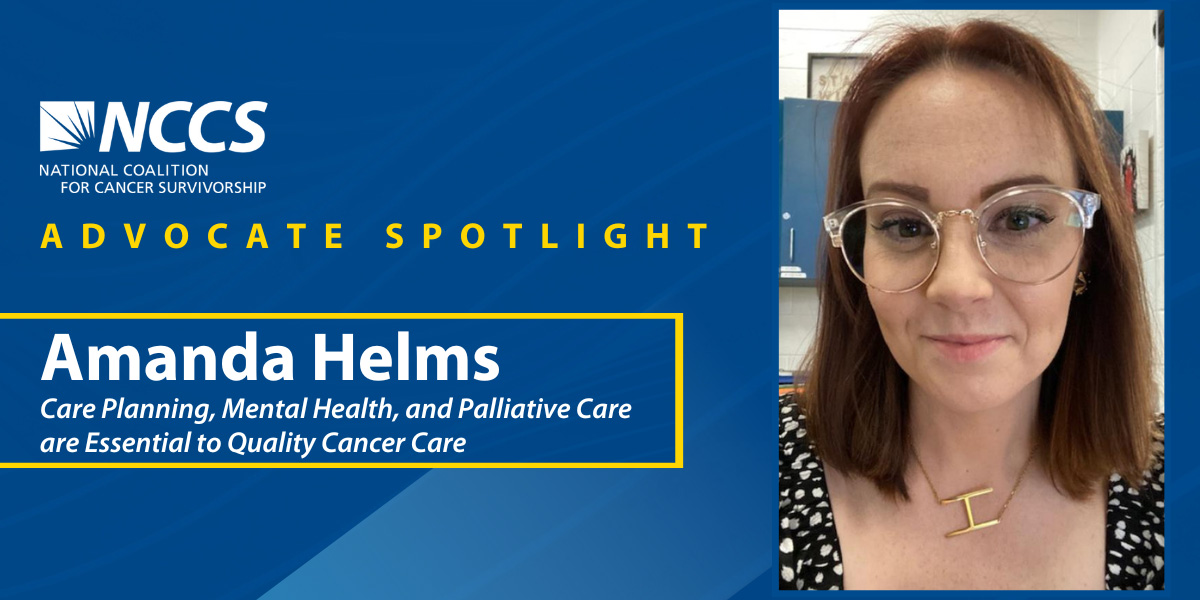Amanda Helms: Care Planning, Mental Health, and Palliative Care are Essential to Quality Cancer Care
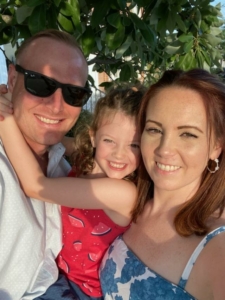 Amanda Helms was enjoying a bubble bath while reading a book when she looked down and noticed a lump on the side of her breast in January of 2020. She had a bad feeling about it instantly, even though she had no family history or risk factors. She went to her family doctor who referred her for a same-day ultrasound of the lump. The radiology technician at her military treatment facility told her that she was being silly to worry since she was a healthy, 33-year-old woman. She was sent on her way with no plan for follow up. Her husband encouraged her to seek a second opinion a week later, and she was diagnosed within a few days with triple negative breast cancer.
Amanda Helms was enjoying a bubble bath while reading a book when she looked down and noticed a lump on the side of her breast in January of 2020. She had a bad feeling about it instantly, even though she had no family history or risk factors. She went to her family doctor who referred her for a same-day ultrasound of the lump. The radiology technician at her military treatment facility told her that she was being silly to worry since she was a healthy, 33-year-old woman. She was sent on her way with no plan for follow up. Her husband encouraged her to seek a second opinion a week later, and she was diagnosed within a few days with triple negative breast cancer.
“I lost my income within weeks of being diagnosed. I had never considered how fragile our security net is in America until it happened to me,” explained Amanda. Two days after diagnosis, she underwent a bilateral mastectomy. In March of 2020, she began 16 rounds of harsh chemotherapy just as COVID-19 lockdowns began. Navigating chemotherapy by herself was one of the most challenging things she has ever done. Amanda would then go on to complete 25 rounds of radiation in September of 2020. Over the course of three years, she has had seven surgeries.
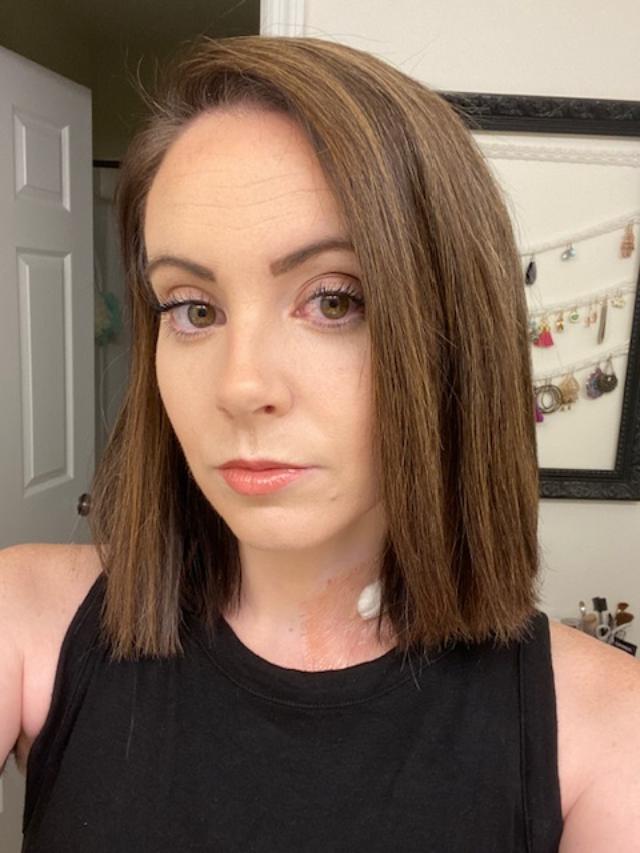
Amanda after her port surgery.
According to Amanda, survivorship continues to be bittersweet. Her life has completely changed in both negative and positive ways. She treasures her time and her relationships so much more than she did before her diagnosis, but she also lives with the weight of what she has endured to survive and the knowledge that her cancer could return at any time. “I find joy in sharing my story to help others become mindful of their bodies regardless of age,” says Amanda. She found solace during treatment through Instagram. She searched the hashtag #breastcancerunder40 as she navigated cancer during a time when there were no support groups or counselors accepting new patients due to the pandemic. She found a treasure trove of survivors who were like her, and that is when she found her tribe. Amanda continues to attend workshops, join AYA cancer meetups around the country, and shares her experience via social media platforms.
Amanda joined NCCS at the In-Person Cancer Policy and Advocacy Team Symposium in Arlington, Virginia for the first time in June 2022. “I learned so much and was both challenged and inspired,” said Amanda. NCCS gave her the opportunity to share her story in a productive way through collaboration with cancer survivors and CUPID medical students. Amanda points out that a huge part of survivorship is figuring out how to move on after a cancer diagnosis. Part of that process for her is in finding a way to make a meaningful difference in the cancer community and for the survivors who come after her. Advocacy and policy work are essential to enacting the change survivors desperately need in cancer care and research.
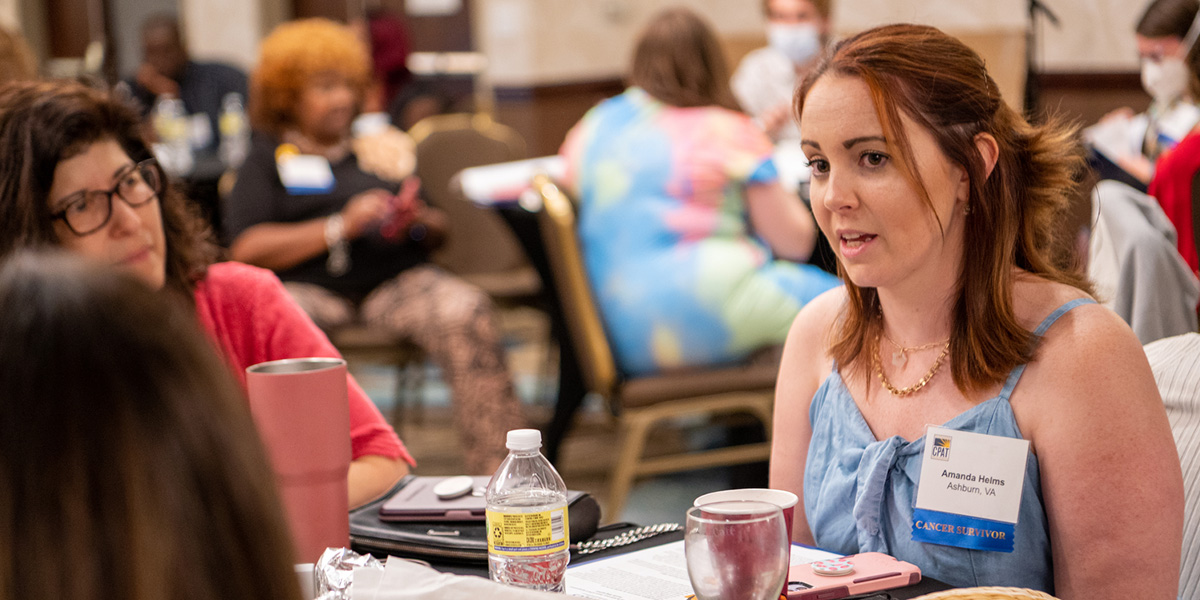
Amanda attended the 2022 NCCS In-Person CPAT Symposium. Photo: Leslie Kossoff/LK Photos.
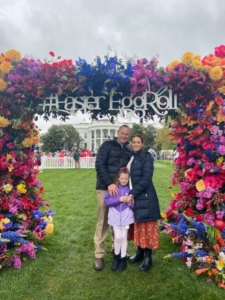 Amanda’s biggest advice for survivors is to take care of your mental health early. “I regret not insisting on starting therapy at diagnosis. Being able to process the trauma as it comes is a much better way to cope than trying to deal with it in the aftermath,” explains Amanda. Her next piece of advice is to never be afraid to ask for palliative care! She suffered unnecessarily through side effects of her medications for several years before she received a referral to a palliative care doctor. “The palliative care doctor was the first person to look at me and tell me that he knew I was in real pain and that it would continue to negatively impact my life if we didn’t treat it,” Amanda shared. Through complimentary medication and care, palliative care has made a huge impact on Amanda’s recovery and continues to help her through her survivorship.
Amanda’s biggest advice for survivors is to take care of your mental health early. “I regret not insisting on starting therapy at diagnosis. Being able to process the trauma as it comes is a much better way to cope than trying to deal with it in the aftermath,” explains Amanda. Her next piece of advice is to never be afraid to ask for palliative care! She suffered unnecessarily through side effects of her medications for several years before she received a referral to a palliative care doctor. “The palliative care doctor was the first person to look at me and tell me that he knew I was in real pain and that it would continue to negatively impact my life if we didn’t treat it,” Amanda shared. Through complimentary medication and care, palliative care has made a huge impact on Amanda’s recovery and continues to help her through her survivorship.
Connect with Amanda online:
Instagram: @amanda_roseeeee
Twitter: @theamandahelms
# # #
